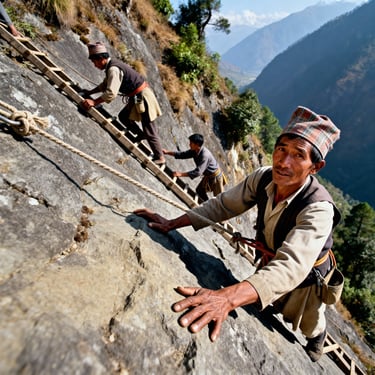The Mad Honey Diaries (Pt.2)
The Ascent and the Song of the Hunters
Jessie Cavendale
11/3/20252 min read


Sleep in Jogipada is not a gentle surrender. It’s a confrontation with silence. The deep, profound quiet of the mountains is a presence itself, broken only by the wind combing through the pines and the occasional chime of a bell around a goat’s neck. I lay on a thin mattress stuffed with straw, my mind racing with a mixture of anticipation and a primal, gnawing fear. Kamal’s words, "Tomorrow, you walk with the hunters," echoed like a mantra.
We assembled before the sun had crested the formidable peaks to the east. The hunting party was smaller than I’d imagined: Kamal, his two sons—quiet, sturdy men in their twenties named Rohan and Bir—and an older man, Dorje, whose face was a web of wrinkles that seemed to map every cliff he’d ever climbed. They moved with an economy of motion, checking coils of handmade rope, smoking the large, wicker baskets they would use to carry the honeycombs, and sharpening their tangis, the long, curved knives that are as much a tool as a weapon here.
There were no safety harnesses, no helmets. Their equipment was ancient, tested by generations, and to them, utterly trustworthy. To me, it looked like a collection of death wishes. I clutched my modern climbing harness, feeling like an imposter.
We left the village as the first light painted the highest snows a blushing pink. The path was not a path for long. It quickly became a treacherous traverse across a steep, shale-covered slope where a misstep would send you sliding hundreds of feet into a roaring river below. I focused on Kamal’s feet, placing my boots precisely where his worn sandals had been. He moved with a preternatural grace, a part of the mountain itself.
After two hours, we reached the base of the cliff. It was a sheer wall of rock, rising hundreds of feet, damp with mist and spray from the waterfall that thundered nearby. And there, I saw them. Dozens of long, rope ladders, kuchis, hung from the top, swaying gently in the abyss. They are not like any ladder I’d ever seen—two main ropes with rungs of lashed-together branches, looking terrifyingly fragile.
This is when the ritual began. Kamal built a small fire, using juniper branches that crackled and released a sacred, purifying smoke. He chanted in a low, guttural tongue, offering prayers to the mountain god, Mahadev, and to the spirit of the bees, Apis laboriosa. He asked for protection and for a successful harvest. The seriousness on their faces was absolute. This was not a job; it was a covenant.
Then, they began to sing. A low, rhythmic, hypnotic chant that wove with the sound of the waterfall. "It is for the bees," Rohan whispered to me, seeing my confusion. "The song soothes them. It tells them we are friends, not enemies. It is the song of our fathers."
Watching Kamal and Rohan begin their ascent up those swinging ladders, barefoot, with smoldering bundles of green leaves to smoke the bees tied to their backs, was the most humbling moment of my life. My own world, with its deadlines and digital noise, seemed not just far away, but trivial. This was raw, elemental courage. This was faith.
I was to stay at the base camp with Dorje, his eyes constantly scanning the cliff face. My role was to observe, to learn, and to wait. As I watched the two tiny figures ascend into the buzzing haze of the giant bees, I understood something fundamental. I had not come for the honey. Not really. I had come to witness the last vestiges of a dying art, to see the price of true magic, paid in courage and tradition.
